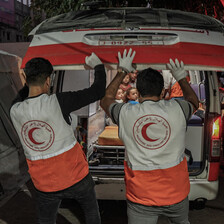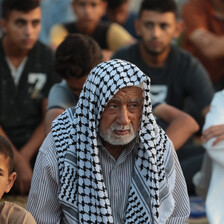The Electronic Intifada 14 June 2024

More than 1 million people in Gaza face catastrophic levels of food insecurity.
APA imagesThe markets in Gaza City are usually full of people and goods before Eid al-Adha. This year they lie in ruins.
Sweets, clothes and festive decorations should be abundant on Palestine Square. This year it plays host to only a few stalls, offering scant merchandise.
Eid al-Adha is supposed to be a feast. Gaza is gripped by famine.
More than 1 million people – about half of Gaza’s population – face catastrophic levels of food insecurity.
On average, just 80 truckloads of humanitarian aid were delivered per day during the first week in June. About 500 truckloads were allowed into Gaza daily before the current genocidal war began.
More than 96 percent of women are not meeting their nutrient requirements, humanitarian groups have calculated.
Walaa, 23, is among them.
“I’ve lost over 40 kilograms and I suffer from anemia,” she said. “It leaves me extremely tired and dizzy.”
She has intestinal issues which she blames on “eating whatever scraps we can find during this famine.”
“And I am on the verge of kidney failure,” she added. “That’s because of the contaminated water we are forced to drink.”
Not having enough food affects people both physically and psychologically.
“The constant state of hunger and food scarcity keeps us on edge,” said Fahim, 20 – a brother of Walaa. “Even when we manage to eat something, it is never enough.”
Baraa is eight months pregnant. A doctor has informed her that the growth of the baby in her womb has stagnated due to acute malnutrition.
“I am constantly worried about my baby’s health,” she said. “I fear the worst.”
While she has been prescribed nutritional supplements, “I haven’t noticed any improvement,” she said.
“Some supplements even cause me to vomit,” she said.
“I can’t nourish myself and my baby with natural food because of the famine,” she added. “And I cannot compensate for that with the supplements I’ve been prescribed.”
The situation is so serious that parents cannot even feed infants.
Ibtihal has a 5-month-old baby named Anas.
“My husband and I have searched tirelessly for formula milk, often finding it by chance and at very expensive prices,” Ibtihal said.
“Even if I can afford it, many other mothers – if they find any – can’t. It’s heartbreaking that our babies are also facing starvation.”
Sondos Alfayoumi is a writer and translator in Gaza.





